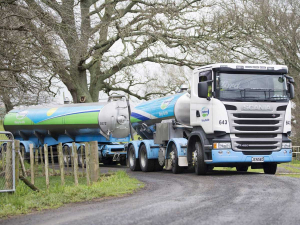Another Windfall for Fonterra Farmers, Unit Holders
Fonterra farmer shareholders and unit holders are in line for another payment in April.
 Waikato-based investor Charles Whiting says he supports Fonterra's proposed capital structure because the status quo isn't working in a declining milk volume environment.
Waikato-based investor Charles Whiting says he supports Fonterra's proposed capital structure because the status quo isn't working in a declining milk volume environment.
OPINION: Making a change to any businesses is difficult. Augmenting a capital structure with the diversity of stakeholders and complexity as at Fonterra is a significant challenge.
That said, change is needed and the proposal on foot is sensible and coupled with a refreshed executable strategy.
Fonterra has been plagued in the last decade with what I call an 'ambition-to-ability' mismatch. In short, Fonterra didn't have the necessary skills to take on the world.
Execution was lacking. Poor choices were made around strategy: a lack of quality thinking and diligence characterised investments. Governors failed in not asking the right questions, or knowing what to ask, and effectively let management run roughshod over a national champion. Some farmers rightly left to pursue other opportunities.
It is often forgotten what would happen if Fonterra didn't exist in its co-operative format. It is very simple. Farmers would be squeezed down to accept lower milk prices just above their breakeven. Money wouldn't end up back in local communities and tax and GST takes would immediately impact government. This on-farm economic multiplier effect delivered by an efficient cooperative is critical to New Zealand. Regardless, New Zealand farmers are resilient and continue to deliver quality nutrition to the world.
The core of this need for quality nutrition underpins the new Fonterra strategy. It plays to Fonterra's strengths, taking account of likely New Zealand production declines (mostly from regulatory pressures), the benefits of New Zealand pasture-based milk (both environmental and nutritionally) and Fonterra's world leading research and development capabilities.
Regardless of the new strategy there is one thing that Fonterra needs to deliver - performance. You can have any capital structure, however, if a business doesn't perform it will fail. Behind performance are three clear requirements: a clear articulated strategy, capable people and measured execution against the plan. It is clear to me that elements of this are coming together. Execution must be held to account by the board and, failing that, by shareholders playing a more active role. We cannot afford more thought experiments using shareholders' capital.
Credit needs to be made for work done already. The level of communication and transparency from the board and management has increased ten-fold. The humility of the current management team and board to own up to mistakes of the business - many of which didn't happen on their watch - has been excellent. Coupled with a sensible and achievable strategy they will position Fonterra for a strong future.
Why will I be supporting the proposed capital structure? Put simply, the status quo doesn't work for a declining milk volume environment.
Personally, I would have gone further and brought back the units and also a number of the 'dry shares'. Either way the option remains. Farmers need to think about their shares as a 'right to supply' because if the strategy is delivered, you will be financially better off to supply Fonterra.
This new capital structure, with an executable strategy, give us confidence to invest on farm and let Fonterra do for future generations what it has for past - deliver prosperity and wealth to rural communities and in turn contribute significantly to New Zealand's global understanding. Dairy is enduring: it can deliver perpetual value, unlike extractive resources. Government and regulators cannot afford to forget this. As a smart man once said, "you can't put iron ore on your Weetbix".
Charles Whiting is a Waikato-based former finance executive investing in dairy and other NZ businesses.
Controls on the movement of fruit and vegetables in the Auckland suburb of Mt Roskill have been lifted.
Fonterra farmer shareholders and unit holders are in line for another payment in April.
Farmers are being encouraged to take a closer look at the refrigerants running inside their on-farm systems, as international and domestic pressure continues to build on high global warming potential (GWP) 400-series refrigerants.
As expected, Fonterra has lifted its 2025-26 forecast farmgate milk price mid-point to $9.50/kgMS.
Bovonic says a return on investment study has found its automated mastitis detection technology, QuadSense, is delivering financial, labour, and animal-health benefits on New Zealand dairy farms worth an estimated $29,547 per season.
Pāmu has welcomed ten new apprentices into its 2026 intake, marking the second year of a scheme designed to equip the next generation of farmers with the skills, knowledge, and experience needed for a thriving career in agriculture.
OPINION: Staying with politics, with less than nine months to go before the general elections, there’s confusion in the Labour…
OPINION: Winston Peters' tirade against the free trade deal stitched with India may not be all political posturing by the…